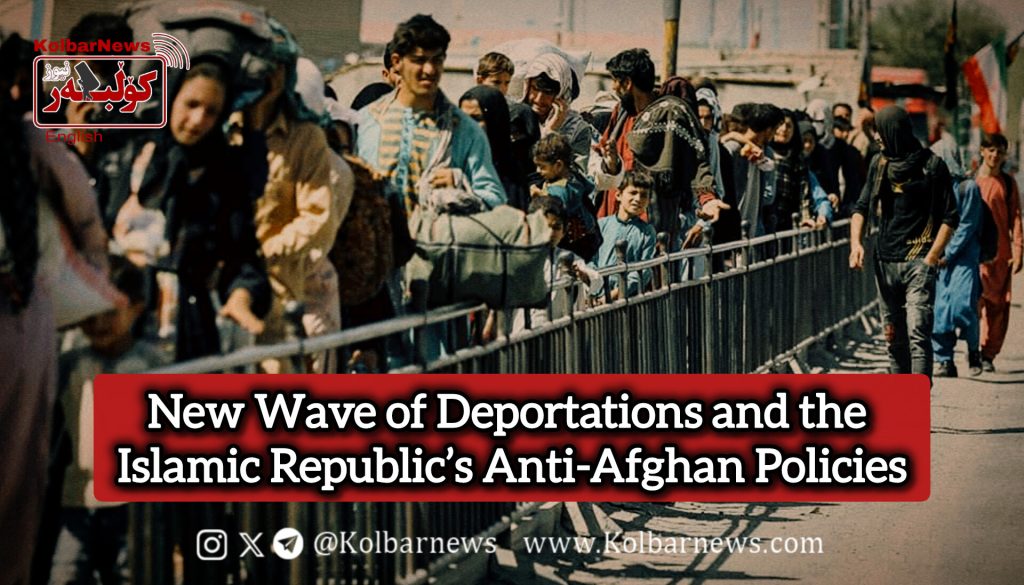
Racist pressure with political motives against Afghan women and men who have been forced to migrate to Iran has intensified dramatically. Immediately after the 12-day war between Israel and the Islamic Republic, Iran’s Minister of Interior issued a directive to the head of the Iranian police ordering a mass expulsion of Afghan migrants from the country. According to this directive, Afghan migrants and refugees without valid government-issued documentation must leave Iran by July 5, 2025.
It is important to note that the overwhelming majority of Afghans living in Iran do not possess official documents, but contrary to official claims, the deportations are not limited to so-called “illegal” migrants. Numerous reports indicate that even Afghans with valid passports and residence permits have been expelled. Many of them were born in Iran and only have Afghan parentage. Before being deported, they are often robbed. Videos show regime agents arresting Afghans, demanding bribes, and even after receiving money, forcing the bribers into deportation camps. Migrants without money are reportedly beaten and crammed into cargo trucks bound for detention centers.
The regime’s police force has declared that renting any property to Afghan migrants is now banned, and violators will face annulment of contracts, property seizures, and closures.
Following this directive, a mass forced return of migrants from Iran to Afghanistan has begun. According to Mehr News Agency, in the first week alone, over 250,000 Afghans were forced to leave Iran. Reports state that 70% of them did not even have time to collect their belongings, having to leave everything behind. In many cases, deportations were accompanied by violence and beatings. For many, access to basic necessities like bread, medicine, and clean water has become extremely difficult.
These actions are part of the regime’s deliberate strategy to divert attention from internal crises such as corruption and economic collapse by scapegoating Afghans as the “enemy”. According to reports, in the first five months of 2025, at least 32 Afghan nationals were executed in Iran, with over 80 executions in 2024. These executions are often carried out without fair trials, access to lawyers, or due process, and under torture.
The Islamic Republic uses state-run media, social networks, and political actors to intensify its anti-Afghan policies. They ignore the crucial role Afghan laborers play in Iran’s economy and exploit minor incidents to fuel hatred. If a crime occurs, media often falsely blame Afghans without investigation. State-loyal media use fabricated research to claim that Afghan migrants are responsible for shortages of water, electricity, and especially bread. They blame the presence of 5 to 8 million Afghan migrants for driving Iranian workers and the poor into further poverty.
Afghan laborers are among the cheapest workforce in Iran, yet they have always faced persecution, exclusion, and humiliation expected to accept their oppressed status. They are denied insurance, housing, and other basic services in many provinces. Images of them caged or violently deported are just a glimpse into the hardships inflicted on them. Now, as anti-migrant sentiment in Western Europe fuels the rise of far-right parties, the Islamic Republic mimics these policies.
It is a well-known fact that Afghan migrant workers are central to economic productivity, generating massive profits for employers. The IRGC has also exploited them in wars, including Syria, leading to the deaths of countless Afghans. So why is anti-Afghan policy now escalating?
The answer lies in political motives shared by authoritarian governments worldwide. For the Islamic Republic and employers alike, migrant scapegoating is a political tool. But this policy in Iran has unique traits the regime is so incapacitated it can’t even provide basic utilities. So, like other far-right systems, it finds a scapegoat: the migrant worker.
While intensifying repression of Afghan migrants, the regime has also arrested over 1,000 political and civil activists and dissenters. Therefore, Iranian workers, women, retirees, and other oppressed groups must deepen their solidarity with Afghan migrants. Above all, racist and chauvinistic propaganda must be challenged. Every effort should be made to resist attacks on Afghan migrants by officials, racists, or uninformed citizens. They must be sheltered when pursued. These actions are not only humanitarian duties but will also strengthen the broader struggle against the Islamic Republic.

